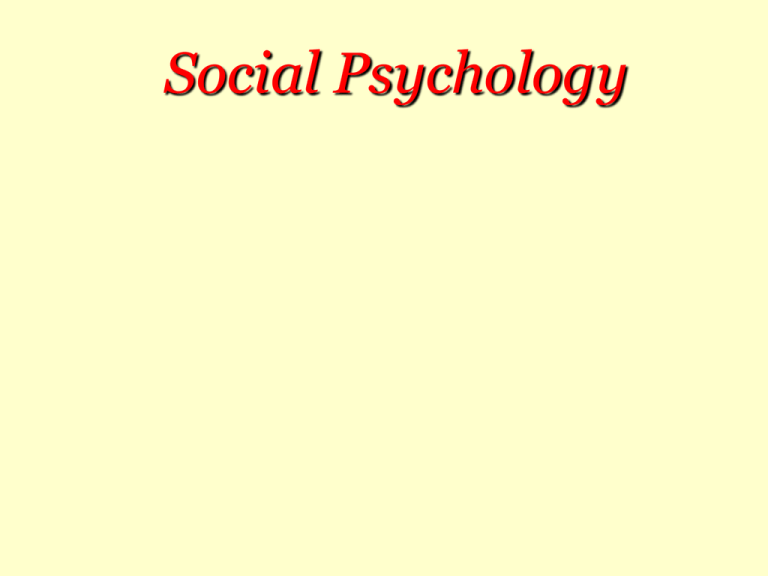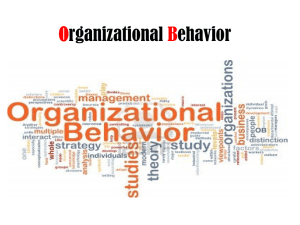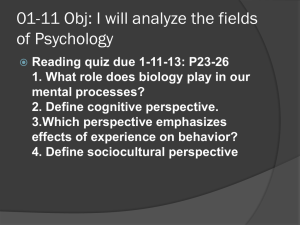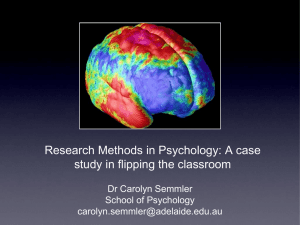Social Psychology
advertisement

Social Psychology Housekeeping matters… 1. My name is Dr. Lisa Zadro Office: Rm 455 Brennan Bdg Email: lisa.zadro@sydney.edu.au Phone: 9036 7059 Housekeeping matters… 2. Lecture notes and tapes – The lectures are taped via Lectopia – The notes will appear on WebCT (typically after lectures). If you have any questions, please see me after the lecture. Housekeeping matters… 3. Being nice to others….. a) Switch off your mobile phone If your phone rings during the lecture, I will make you stand up and sing Celine Dion’s “My Heart Will Go On.” b) No speaking in lectures (PS I can see everything from up here) Lecture 1: Introduction to Social Psychology Definitions & Methods What do Social Psychologists study? • Social phenomena such as: – Deception: e.g., Can you tell if someone is lying to you? – Attraction: e.g., Maximising your potential to attract a mate – Tactics of Manipulation: e.g., How to get your way? – Aggression: e.g., Why do mobs become violent? – Stereotypes and prejudice • We also try to understand and explain social events e.g., Sept 11th, Cronulla race riots, or even elevator behaviour Outline • What is Social Psychology? – Definitions – Why study Social Psychology? – Social Psychology vs. common sense • Studying Social Behaviour – Person perspective – Situational perspective – Interaction between the person and the situation • Methods of research – Descriptive (non-experimental) Methods – Experimental Methods Definition: What is Social Psychology? • Allport, 1935: ‘…the scientific investigation of how the thoughts, feelings, and behaviours of individuals are influenced by the actual or implied presence of others…’ • Social psychology links ordinary people’s affective states (feelings and emotions), behaviour (the way they act), and their cognition (their thought processes), to their social world. • Social Psychology researchers want to know what people do and when, but also why they do it (i.e., causation). • Allport’s definition emphasises social influence e.g., conformity, obedience, persuasion. • However, social psychologists also study… — Social Perception (how do we think of individuals and/or groups?) e.g., impression formation, attraction, stereotyping — Social Interaction (how do individuals interact with each other?). e.g., aggression + conflict, helping, prejudice, communication. Why study Social Psychology? • Once upon a time, we were hairy…. • Is it possible to live alone? (Hermits, shipwrecked people… serial killers?) • Social isolation leads to psychological problems – Vokart et al., (1983), prisoners in solitary confinement – “brainwashing” • Social isolation also leads to health problems – Adverse impact on health and well-being that is comparable to damaging health factors such as obesity, smoking, and high blood pressure (Kiecolt-Glaser et al., 1992). • Schachter (1959) studied social isolation – Isolated five volunteers in a windowless room for as long as they could endure FOUND: Considerable individual differences in the amount of time people could tolerate isolation – One lasted 2 hrs (“almost hammering the door to get out”) – Three participants lasted two days (two were unaffected by the experience, one was uneasy) – The fifth participant lasted 8 days without suffering from adverse reactions Common Sense vs. Social Psychology • But aren’t we all social psychologists? • Cullen Murphy (1990): “sociology, psychology, and other social sciences are far too often merely discerning the obvious or confirming the commonplace” Common sense vs. Social Psychology (cont) But then again…. There’s… • Too many cooks spoil the broth • Many hands make light work • You can’t teach an old dog new tricks • You’re never too old to learn • Birds of a feather flock together • Opposites attract • He who hesitates is lost • You should look before you leap • Common sense: cannot distinguish between coincidence and causality • Science: when, where, why, and how events occur • What distinguishes social psychology from common sense is that social psychologists, like other sciences, use scientific methods to test their theories. Studying Social Behaviour • Social behaviour is goal oriented • Social behaviour represents a continual interaction between the person and the situation • Person: features or characteristics that individuals carry into social situations • Situation: the environmental events or circumstances outside the person • Persons and situations influence each other in a number of ways 1. Different people respond differently to the same situation 2. Situations choose the person 3. People choose their situation 4. Different situations bring out different parts of the person 5. People change the situation 6. Situations change the person Thoughts Situational Influences Person Feelings Personal Influences Behaviours Are these people evil, or is there another explanation for their behaviour? Observations Theory Predictions Research design Data Research Methods in Social Psychology Descriptive Methods (Non-experimental): Involve attempts to measure or record thoughts, feelings, and/or behaviours in their natural state. Experimental Methods: Involve attempts to manipulate social processes by varying and controlling some aspect of the situation. Research Methods (cont) Descriptive (Non-experimental) Methods 1. Naturalistic Observation 2. Archival Studies 3. Surveys Descriptive (Non-experimental) Methods 1. Naturalistic Observation Involves observing behaviour as it unfolds in its natural setting. e.g., Barner-Barry (1986) observed how young children interact with a bully Descriptive (Non-experimental) Methods 2. Archival Research Involves examining archives or public records of social behaviour. e.g., Gordon, Musher-Eizenman, Holub, & Dalrymple (2004) examined what children are thankful for pre- and post Sept 11. FOUND: Children were more grateful for US values (freedom) and rescue workers after Sept 11. Descriptive (Non-experimental) Methods 3. Surveys Involves asking people questions about their beliefs, thoughts, feelings, and behaviours. e.g., Faulkner, Williams, Sherman, & Williams (1997) surveyed how often people give and receive the “silent treatment” FOUND: 67% admitted to using it 75% indicated that they have received it Descriptive (Non-experimental) Methods The Descriptive (non-experimental) methods are useful in determining the association between variables (i.e., correlation). Correlation—the extent to which two or more variables are associated with one another Positive Correlation The more time you spend studying The higher your exam mark The less time you spend studying The lower your exam mark Negative Correlation The more alcohol you drink before an exam The lower your exam mark Descriptive (Non-experimental) Methods If we know that two variables are highly correlated (e.g., there is more damage after a fire when there are more fire trucks at the scene), is there a causal relationship between them? Descriptive (Non-experimental) Methods Variable A could cause Variable B VARIABLE A VARIABLE B (fire trucks) (damage) More fire trucks at the scene of a fire cause more damage. Descriptive (non-experimental) Methods Variable B could cause Variable A VARIABLE A VARIABLE B (fire trucks) (damage) Passing fire trucks may stop to watch at scenes where there is a lot of fire damage. Descriptive (non-experimental) Methods OR a third variable could cause A & B VARIABLE C (severity of the fire) VARIABLE A VARIABLE B (fire trucks) (damage) A severe fire will lead to lots of damage and many fire trucks will turn up to fight the blaze, but the two are not causally related. In order to determine causality, we must turn to experimental methods What is an experiment? An experiment is a research method in which the researcher sets out to systematically manipulate one source of influence while holding others constant. Experimental Methods Social Psychologists use two major types of experimental methods: 1. Field experiments (a.k.a field studies) 2. Laboratory experiments Experimental Methods 1. Field Experiments Involve the manipulation of variables using unknowing participants in natural settings. e.g., Milgram, Bickman, & Berkowitz (1969) examined the influence of a crowd—would passers-by copy a crowd of 1, 2, 3, 5, 10, or 15 people? FOUND: Only 4% copied a single person, 40% copied 15 people Experimental Methods 1. Field Experiments Involve the manipulation of variables using unknowing participants in natural settings. e.g., Milgram, Bickman, & Berkowitz (1969) examined the influence of a crowd—would passers-by copy a crowd of 1, 2, 3, 5, 10, or 15 people? FOUND: Only 4% copied a single person, 40% copied 15 people Experimental Methods 2. Laboratory Experiments Involve the direct manipulation of variables and the observation of their effects on the behaviour of other variables. Summary • Social psychology scientifically investigates the thoughts, feelings, and behaviours of people in their social environment • Social psychologists use a variety of descriptive and experimental methods to investigate social phenomena • The use of scientific methods separates social psychology from common sense.







